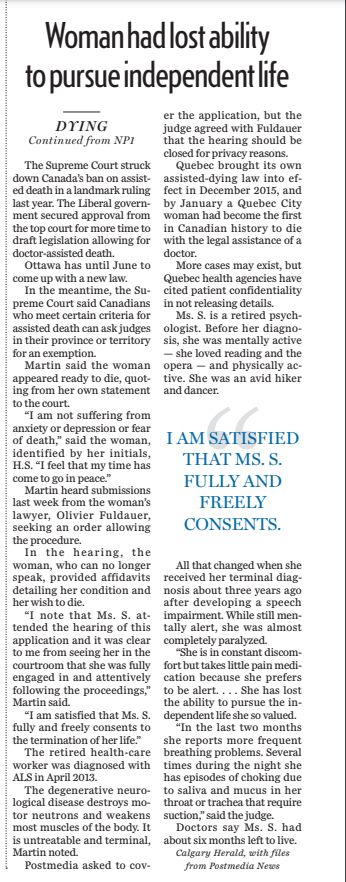

Article content
On this date, March 1, in history:
In 589 (traditional date): David of Wales, patron saint of Wales, died.
Article content
In 1562, Roman Catholic troops killed Protestants at Vassy, France, in an incident that precipitated the Wars of Religion. The disorder, which swept over France almost unchecked for nearly 40 years, ended when Henry IV of Navarre seized the French throne and granted the Protestants — known as Huguenots — partial freedom.
Advertisement 2
Article content
In 1632, Samuel de Champlain was appointed the first governor of New France.
In 1633, English poet and cleric George Herbert died. His devotional poems, collected in The Temple, exemplify the metaphysical tradition.
In 1638, the first Swedish settlers, inventors of the log cabin, arrived in North America.
In 1692, the first three women charged with witchcraft were sentenced to hang in Salem, Mass.
In 1780, Pennsylvania became the first U.S. state to pass an act to abolish slavery.
In 1790, President George Washington signed a measure authorizing the first U.S. Census. Once it was completed in August, it showed a population of 3.9 million.
In 1808, the African slave trade was banned by the U.S. Congress.
In 1810, Sweden appointed the world’s first national ombudsman.
In 1872, U.S. President Ulysses S. Grant signed an act creating Yellowstone National Park.
In 1875, the Hospital for Sick Children opened in Toronto with six beds and one nurse. A group of women led by Elizabeth McMaster rented an 11-room house for $320 a year and declared the hospital open for “the admission and treatment of children.”
Advertisement 3
Article content
In 1888, parcel post between Canada and the United States was established.
In 1917, the Alberta Provincial Police Force was established.

In 1927, the Judicial Committee of the British Privy Council awarded Labrador to Newfoundland over a claim from Quebec.
In 1927, the first Dominion men’s curling championship — better known as the Brier — began at the Granite Club in Toronto. The invitational event featured eight teams from Ontario, Quebec, New Brunswick, Nova Scotia and Saskatchewan. The first national champions were a Halifax team skipped by Murray MacNeill.
In 1932, baby Charles Augustus Lindbergh Jr., son of aviator Charles Lindbergh and his wife Anne Morrow, was kidnapped from his home in Hopewell, N.J. The baby’s body was found nearby on May 12. Bruno Hauptmann was convicted of kidnapping and murder in 1935 and sentenced to die in the electric chair.

In 1939, Trans Canada Airlines, now Air Canada, inaugurated the trans-continental airmail service.
In 1943, work began on the Alaska Highway.
In 1950, Chiang Kai-shek resumed the presidency of Nationalist China, present-day Taiwan.
Article content
Advertisement 4
Article content
In 1950, Klaus Fuchs, scientist and communist, was sentenced in London to 14 years in prison for giving British and American atomic secrets to the Soviet Union.
In 1954, the United States carried out the first hydrogen bomb test at Bikini Atoll in the Marshall Islands of the North Pacific.
In 1961, U.S. President John F. Kennedy established the Peace Corps.

In 1962, all 95 passengers died when an airliner crashed shortly after takeoff at New York’s Idlewild (now Kennedy) Airport.
In 1963, the British Columbia government converted Victoria College to the University of Victoria and established Simon Fraser University at Burnaby.
In 1963, the world’s first liver transplant took place in Boulder, Colo.
In 1965, a gas explosion in a Montreal apartment block killed 28 people.
In 1966, the Soviet Venus 3 spacecraft touched down on Venus.
In 1970, the first overseas direct-dial phone calls were made between New York and London.
In 1974, seven former aides of U.S. President Richard Nixon were indicted in the Watergate scandal.
In 1979, the governing party of Adolfo Suarez was returned in the Spanish general election.
Advertisement 5
Article content
In 1979, the U.S. and China formalized relations by opening embassies for the first time since the Communist government took power in Beijing in 1949.
In 1981, IRA member Bobby Sands began a hunger strike at the Maze prison in Northern Ireland. Sands, who demanded Irish nationalists be considered political prisoners and not common criminals, was elected to Parliament during his 65-day fast. He died on May 5. By Oct. 3, nine more hunger strikers had died. The remaining prisoners were persuaded to end their strike.
In 1982, the Ford Motor Company and the United Auto Workers union signed the industry’s first concessionary contract. It froze wages in return for job security and profit-sharing.
In 1983, the federal government dropped a rule requiring licenses for private ownership of satellite TV receivers.
In 1988, Wayne Gretzky notched the 1,050th assist of his NHL career, surpassing Gordie Howe as the league’s all-time assist leader. By the time Gretzky retired after the 1998-99 season, he had amassed 1,963 assists.

In 1995, soldiers at CFB Petawawa marched with their comrades in the Canadian Airborne Regiment for the last time. The regiment was disbanded earlier in the year by Defence Minister David Collenette after a disastrous mission to Somalia.
Advertisement 6
Article content
In 1996, RCMP arrested Kevin Barry Snow, who was trying to enter the grounds of 24 Sussex Drive. Snow pleaded guilty to trespassing and was sentenced to four days in jail.
In 1999, the international treaty banning anti-personnel landmines came into force.
In 2003, Khalid Shaikh Mohammed, a top al-Qaida suspect accused of orchestrating the 9-11 attacks, was captured in Rawalpindi, Pakistan.
In 2004, nine Hells Angels and associates were found guilty on a variety of charges, including drug trafficking, conspiracy to murder and gangsterism in a year-long trial, one of the longest criminal jury trials in Canadian history.
In 2005, Ontario became the first province to pass legislation to ban pit bulls.
In 2005, Holocaust denier Ernst Zundel was deported to Germany, ending four controversial decades in Canada. Zundel was immediately arrested and prosecuted on charges of spreading hate. He would spend five years in a German prison before being freed on this day in 2010.
In 2006, Prime Minister Harper confirmed the appointment of Marshall Rothstein as the newest member of the Supreme Court of Canada. He was the first high court nominee in history to face questions from a committee of MPs.
Advertisement 7
Article content
In 2007, the Supreme Court of Canada struck down as unconstitutional part of a law limiting survivor benefits to gay people whose partners died after Jan. 1, 1998 — but refused to extend those CPP payments retroactively back to 1985 when constitutional equality rights first came into effect.
In 2007, tornadoes ripped through Alabama and killed at least 18 people, including 15 at a high school.
In 2008, USS New York, an amphibious assault ship built with scrap steel from the ruins of the World Trade Center, was christened at Avondale, La.
In 2009, scientists at Mount Sinai Hospital in Toronto announced they had developed a new method for generating stem cells from adult human tissue.
In 2009, Prime Minister Stephen Harper said in an interview with CNN that “frankly, we are not going to ever defeat the insurgency,” in Afghanistan.
In 2011, the Oprah Winfrey Network (OWN) hit Canadian airwaves, three months after debuting in the United States.
In 2014, Russian troops took over the strategic Crimean peninsula in Ukraine despite calls by U.S. President Barack Obama for Moscow to pull back its forces.
Advertisement 8
Article content
In 2016, a Calgary woman who received a legal exemption for doctor-assisted death ended her life in Vancouver with the help of two physicians. She was in the final stages of amyotrophic lateral sclerosis, or ALS, also known as Lou Gehrig’s disease.

In 2017, the Dow Jones Industrial Average closed above 21,000 for the first time.
In 2019, the defence team for Huawei executive Meng Wanzhou filed a notice of civil claim alleging “serious violations” of her constitutional rights, accusing officers of detaining and questioning her for three hours before notifying her of her arrest. The suit filed with the B.C. Supreme Court names members of the Canadian Border Services Agency, the RCMP and the federal government.
In 2019, the Quebec Court of Appeal upheld a landmark judgment that ordered three tobacco companies to pay billions of dollars in damages to Quebec smokers. Imperial Tobacco, JTI-Macdonald and Rothmans-Benson & Hedges had appealed a ruling that found the companies chose profits over the health of their customers.
In 2020, the spreading epidemic soon to be known as COVID-19 shut down France’s Louvre Museum, as Italy was recognized as the epicentre of the outbreak in Europe. A new U.S. government advisory urged Americans not to travel to two Italian regions hardest hit by the new virus, Lombardy and Veneto.
In 2021, Degrassi: The Next Generation star Jahmil French died at the age of 29. His agent confirmed French’s passing to The Canadian Press, but gave no details or cause of death. French played high-school student Dave Turner on the Toronto-shot teen series. Degrassi: The Next Generation co-creator and executive producer Linda Schuyler said she was “heartbroken” to hear the news yesterday and called French an “extraordinary talent and a bright light on and off the screen.”
Article content

